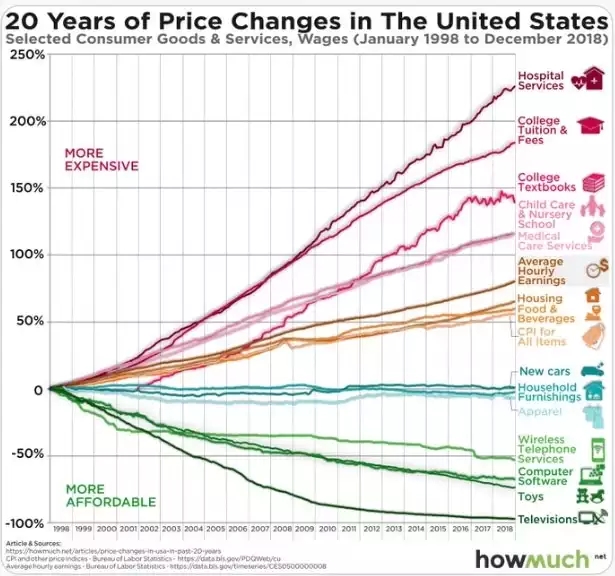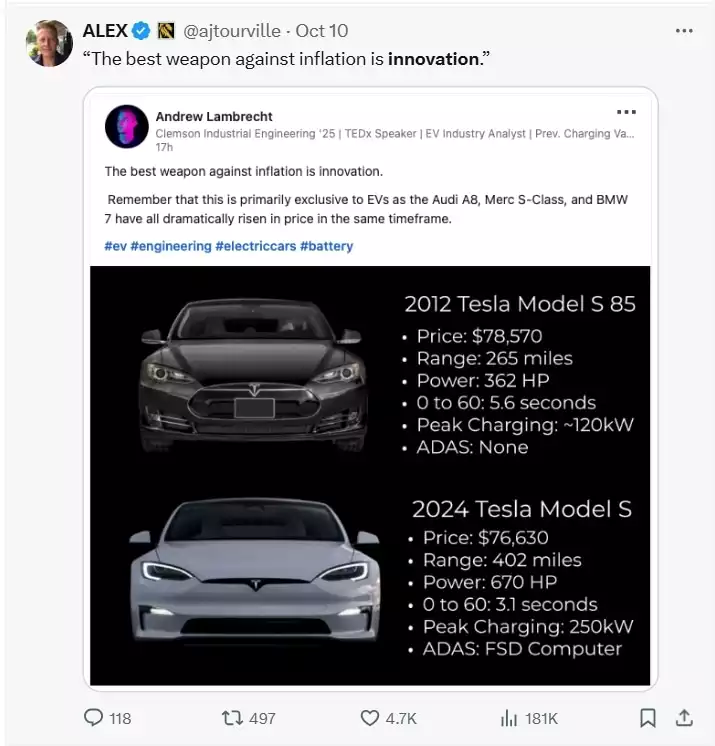The European Union's Innovation Problem
News
|
Posted 16/10/2024
|
1321
As Elon Musk sends a rocket to space and then catches it with robotic hands the same week, he announces an AI robot that will solve the world’s cheap labour and loneliness demands. The rest of the world, including Europe, has worked out they have an innovation issue. But Elon Musk isn’t the U.S.’ only solution (being an import from South Africa – so not U.S. born and bred) to innovation. The Magnificent 7 (Alphabet, Amazon, Apple, Meta, Microsoft, Nvidia, Tesla) have been responsible for most of the world’s most notable innovations in the last 30 years (some good, some bad). This concentration of innovation in America has led to soaring a Magnificent 7.
Innovation controls Inflation
Apart from the recent inflation caused by COVID-19, a 20-year review of prices between 1998 and 2018 shows that industries that embraced innovation saw their products become more affordable. For example, televisions have seen a dramatic 90% price drop, a stark contrast to the $20,000 flat screens of the early 2000s.

The introduction of the Tesla and EVs has seen the price of a car hold for 20 years, this is remarkable considering the price of steel during that time with iron ore costing $10/tonne in 1998 and $72/tonne in 2018. The 2012 Tesla Model S was $78,000 new, in 2024 the same new car is $76,000.

Top innovations of last 30 years
A recent article from INVENTgen listed the top 30 innovations of the past 30 years. While some, such as AI and smartphones from the "Magnificent 7," stand out as significant, many of the others, though interesting, don't necessarily represent groundbreaking advancements. Instead, they seem to focus more on general improvements in areas like renewables, robotics, medicine, and materials.
If we look back at the industrial revolution, the invention of antibiotics, pantyhose, and plastics, or the start of the internet; these were groundbreaking innovations in robotics, medicine, materials and information technology. However, we haven't seen such transformative leaps in recent times. The next big breakthrough might come from AI, space exploration, or transport, but who out there, other than the "Magnificent 7," has the drive to push for these real advancements?
The Draghi Report - Europe’s Innovation Problem
Last month the Eurobloc (countries within the European Union that have adopted the euro as their official currency) released a long-awaited report on the state of innovation in Europe. They identified that across its 27 members, there has been a distinct lack of innovation over the last 50 years.
The report describes innovation in Europe as ‘low industrial dynamism, low innovation, low investment, and low productivity growth’
They identify 4 areas to focus on
- The Innovation Gap – new ventures struggle with scaling due to fragmentation with cumbersome regulation and inadequate funding. In the last 50 years, Europe has not established a single company with a market capitalisation of €100+ billion from scratch. Compare this to the U.S. trillion-dollar Magnificent 7.
- The Trade-off Between Competitiveness and Decarbonisation - in the past decade the energy competitiveness of Europe has collapsed, the shutting down of nuclear power plants with the Ukraine/Russia war stopping cheap Russian oil across pipelines has decimated industry. Compare this to the U.S. which has become the biggest oil-producing country in the world.
- The Financial Gap - the report calls for increased investment in innovation – 4.5% of EU GDP ($750-$800 billion).
- The Need for Less Regulatory Complexity - this appears to be a constant issue the world is facing. Governments have become too big and too cumbersome and are the root cause of innovation failure. If you want innovation – reduce regulation and government burden.
If the world is going to fix its inflation, low morale and low birthrate problems – it may be best to look toward getting governments out of the way of real innovation.